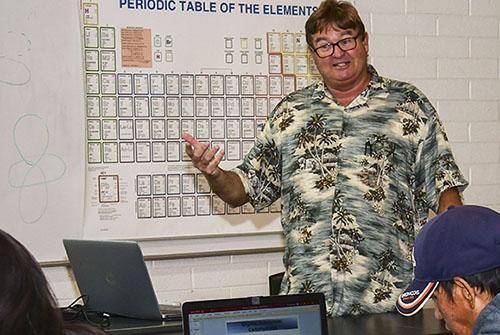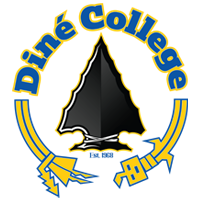
Fred Boyd, Ph.D./Diné College Professor
FOR IMMEDIATE RELEASE
August 29, 2019
Contacts:
Gloria Bloomer, 520-626-4164, gbloomer@email.arizona.edu
Bernie Dotson/George Joe, 928-724-6695, bdotson@dinecollege.edu
TUCSON, Ariz. – A partnership between the University of Arizona and Diné College researchers will train Diné College students in neuroscience over the next five years with a $1.3 million National Institutes of Health grant.
While the focus of the funds is to create a pipeline of scholars to advance from Diné College to neuroscience programs at top-tier research universities, the grant’s goal is to engage selected scholars — irrespective of course of study — and increase the number of Native Americans in graduate schools and research careers.
Kathleen Rodgers, Ph.D, associate director of translational neuroscience for the University of Arizona Health Sciences Center for Innovation in Brain Science (CIBS) and Roberta Diaz Brinton, Ph.D, director of the Center, and Fred Boyd, Ph.D, at Diné College, have been awarded the NIH grant to develop a cooperative training program to create a pipeline of Navajo students to advance from Diné College to neuroscience programs at top-tier research universities.
”We have a dire need for more neuroscientists on the Navajo Nation,” Diné College President Charles Monty Roessel, Ed.D, said. “This program will increase the number of Navajo neuroscientists in the coming years. We’re very excited.”
Supported by a five-year grant, the UA’s URBRAIN (Undergraduate Readying for Burgeoning Research for American Indian Neuroscientists) program is a “culturally aware and community-oriented” collaborative partnership with Diné College.
“This is a project that benefits Navajo students at Diné College and will have financial, intellectual and motivational benefits for these students,” said Fred Boyd, Ph.D, a Diné College instructor and collaborator in the training program.
“Through this partnership, we will enable students to pursue the creation of innovative treatments and cures that will have lasting impact in their communities and around the world,” said U of A President Robert C. Robbins, MD.
Native Americans are among the most underrepresented groups in the biomedical sciences, accounting for just 0.5 percent of the total workforce, lower than any other racial or ethnic group, according to the NIH.
Additionally, Native Americans face significant disparities in health care compared to other U.S. populations. Though more than a third of the most prevalent health disparities in Native American communities are related to brain health, the diagnosis, treatment and study of these disorders is complex.
CONTACT US
Marie R. Etsitty Nez
Vice President of External Affairs
marienez@dinecollege.edu
928-724-6985
George Joe, M.A., M.Ed, Director Of Marketing and Communications
grjoe@dinecollege.edu
928-724-6695
Bernie Dotson, Public Relations Officer
bdotson@dinecollege.edu
928-724-6697
